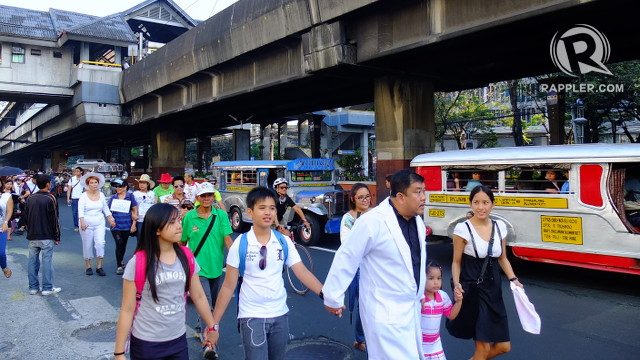SUMMARY
This is AI generated summarization, which may have errors. For context, always refer to the full article.

MANILA, Philippines – The Supreme Court (SC) on Tuesday, March 7, denied a petition for a writ of kalikasan seeking to implement a road-sharing policy in Philippine roads.
During its en banc session, the SC dismissed for lack of merit the petition for the writ of kalikasan and continuing mandamus.
“The Court found that the allegations and supporting evidence fell short of showing an actual threatened violation of petitioners’ constitutional right to a balanced and healthful ecology arising from unlawful act or omission by, or any unlawful neglect on the part of, respondents that should warrant the issuance of the writs prayed for,” SC spokesman Theodore Te said.
In 2014, environmental advocates filed a petition for a writ of kalikasan, a legal action demanding that government agencies be taken to task for failing to protect Filipinos from alarming environmental damage.
The group, calling themselves the Share the Road Movement, wants to compel government to implement the road sharing policy, which would divide roads in half: one half for motor vehicles, and the other half for collective transport systems like bike lanes, sidewalks, bus rapid transit, and trains. (READ: Commuters to gov’t: Limit cars to half of the roads)
The principle is already enshrined in Philippine laws, with Executive Order 774 requiring the government to create a system that “shall favor non-motorized locomotion and collective transportation systems (walking, bicycling, and the man-powered mini-train).”
The petitioners also asked the Court to direct government employees to take public transportation 50% of the time.
They also wanted the public works department to demarcate right-of-way in all roads and sidewalks and to release funds from the road user’s tax for the road sharing policy.
But the SC said this cannot be allowed because collections from the road user’s tax are allocated for specific purposes, such as road maintenance.
“The Court found no basis for the writs because the acts sought to be compelled are not ministerial in nature but discretionary in character; it also noted that the petition failed to establish any failure on the part of public respondents in the performance of their duties that could result in violation of any of the rights claimed by petitioner,” the SC said.
Named respondents in the petition were the Climate Change Commission, Department of Transportation, Department of Public Works and Highways, the Road Board, Department of the Interior and Local Government, Department of Environment and Natural Resources, Department of Budget and Management, Metropolitan Manila Development Authority, and Department of Agriculture. – Rappler.com
Add a comment
How does this make you feel?
There are no comments yet. Add your comment to start the conversation.